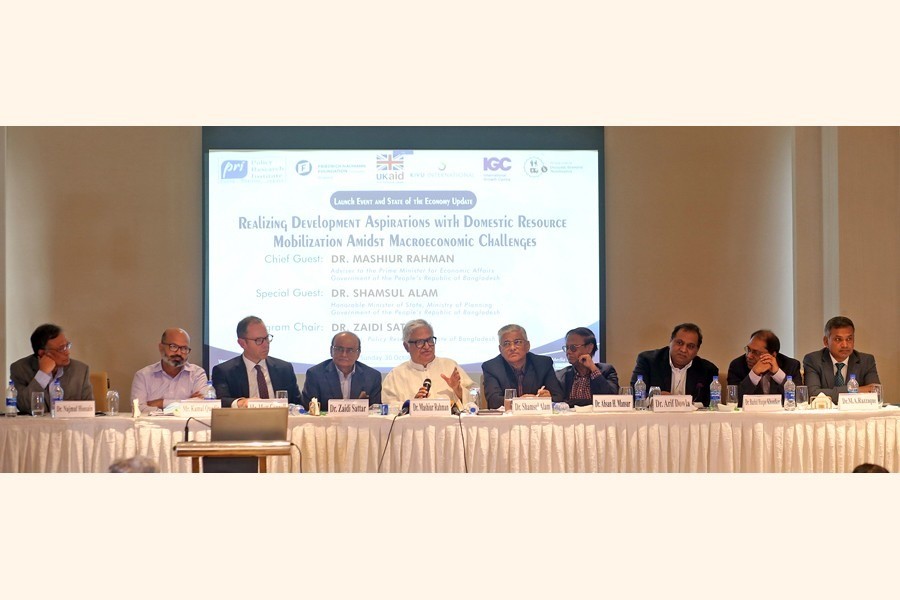Bangladesh should make vigorous efforts to contain its current account deficit (CAD), opt for exchange rate unification, and restrain import demand to avoid a potential financial crisis, experts said in a programme on Sunday.
Besides, they suggested taking effective measures to maintain good growth in export as well as encouraging remittance inflow via the formal channel to bridge the gap in the balance of payment.
They also emphasised mobilising local resources to meet domestic demand to reduce pressure on imports and save foreign currency.
They made the remarks at a seminar - "Realising Development Aspirations with Domestic Resource Mobilisation amidst Macroeconomic Challenges" - organised by the Policy Research Institute of Bangladesh (PRI) at a hotel in the city's Banani area.
Prime Minister's Economic Affairs Adviser Dr Mashiur Rahman addressed the event as the chief guest. State Minister for Planning Dr Shamsul Alam spoke in the programme as the special guest, with PRI Chairman Dr Zaidi Sattar in the chair.
Besides, ACI Managing Director Dr Arif Dowla, bKash Ltd CEO Kamal Quadir, Friedrich Naumann Foundation Bangladesh Country Representative Dr Najmul Hossain, Foreign, Commonwealth & Development Office (FCDO) Development Director (Bangladesh) Matt Cannell, PRI Research Director Dr M A Razzaque, and PRI Director Dr Bazlul Haque Khondker also spoke on the occasion.
In a presentation, Dr Sattar said the deficit in the current account reveals that the nation is spending more than its income, but it is needed to ask where the extra spending is going.
Terming Bangladesh's CAD of 4.0 per cent of the GDP in fiscal year (FY) 2022 too high, he said, "Historical and cross-country analysis shows if CAD runs over 3.0 per cent for three to five years, the economy may fall into a financial crisis as well as experience slowing down of growth."
"We can't allow that to happen here," he said, adding: the government should sincerely try to bring the CAD down under 3.0 per cent of the GDP.
He also mentioned that the International Monetary Fund (IMF) projected that the CAD would stand at 3.7 per cent of the GDP in 2027, which may not be a good thing for the country.
The PRI chairman projected that the taka may depreciate further against the dollar, as the US Federal Reserve may raise interest rates - if US inflation does not slow down.
Currency has not just depreciated in Bangladesh, rather the emerging economies around the world collectively lost over US$ 200 billion recently, he added.
"Multiple exchange rate is not a good idea. Instead, the government should move for unified rate, as it has been proven suitable for most economies."
Besides, Dr Sattar suggested withdrawing all regulatory duties (RDs) on imports to ease the raging inflation, which is not a result of increased demand, but rather has come from the supply side.
He also underlined that weak governance in the financial sector, high non-performing loans (NPLs) in the banking system, low tax-GDP ratio, over-reliance on trade taxes, lack of export diversification, dependency on the single export product, and weak negotiation capacity in international trade talks, among others, are the key challenges of Bangladesh economy.
The prime minister's adviser emphasised carrying out studies to find out ways to raise the tax-GDP ratio, which is one of the lowest among the emerging economies around the world.
He said if the export growth continues nicely, repayment of loans would not be a problem; however, mid- to long-term measures are required for the betterment of the economy.
Responding to the suggestion of a uniform exchange rate, Dr Mashiur said, "Uniformity is good, but if there is a scope of making social justice to some people, the government wants to give the benefit."
The Bangladeshi labour force has expertise in labour-intensive and low-tech industries, he noted, adding: "To become a middle-income country and then a high-income country, technological intervention is much needed in labour market."
Referring to the incentivisation of some industries, the adviser said, "Some industries get incentive for obvious reasons, but it becomes their habit... and it can't be taken away from them to divert to other industries."
Emphasising taking more actions to stabilise micro-economic challenges, Dr Mansur said, "Storms come, but it is the owner's responsibility to protect the home."
Referring to depleting reserve, he opined, "Regarding calculation of reserve, Bangladesh needs to adopt international best practices and define reserve in the right way."
He also suggested rationalising fertiliser subsidies in a bid to reduce the excessive use of chemical fertilisers.
The state minister for planning said under the current circumstances, containing inflation should be the key focus of the government.
On the other hand, thrust in revenue collection should not be enforced on the authority concerned in the testing time.
He also favoured finding a mechanism to unify the foreign exchange rates.
The ACI managing director said tech intervention in fertiliser use, especially a mix of urea and organic fertiliser can reduce agricultural production costs by at least 30 per cent.
He also claimed that subsidies sometimes reduce competitiveness in an industry, so there is a scope for rethinking facilitation.
The bKash CEO, referring to the contribution of the MFS in bringing remittance in the country, said last year, his company brought $280 million in remittance through 12 banks, and the figure may reach about $400 million this year.
However, Mr Quadir mentioned that the remitters get about Tk 95-97 per dollar and the kerb market rate is quite high than the bank rate, which is a major reason for migrant workers to become victims of 'hundi'.
In another presentation, the PRI research director said the current tax-GDP ratio in Bangladesh is about 8.7 per cent against the target of 10.6 per cent, which is one of the lowest in the world.
Of the total revenue, 31 per cent is collected from direct tax, while 69 per cent is generated from indirect tax, Dr Razzaque said, adding: "The country should raise its tax-GDP ratio to 15 per cent."


